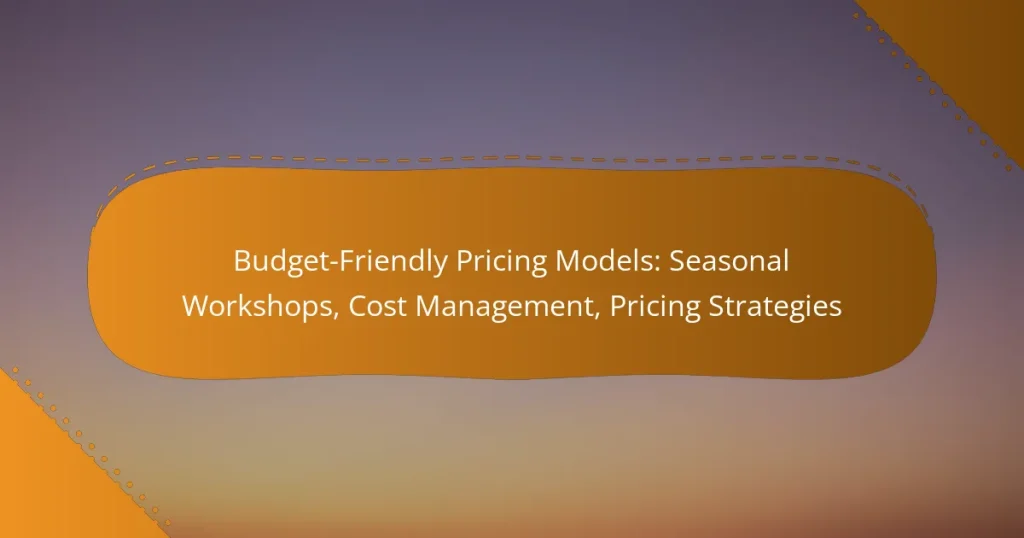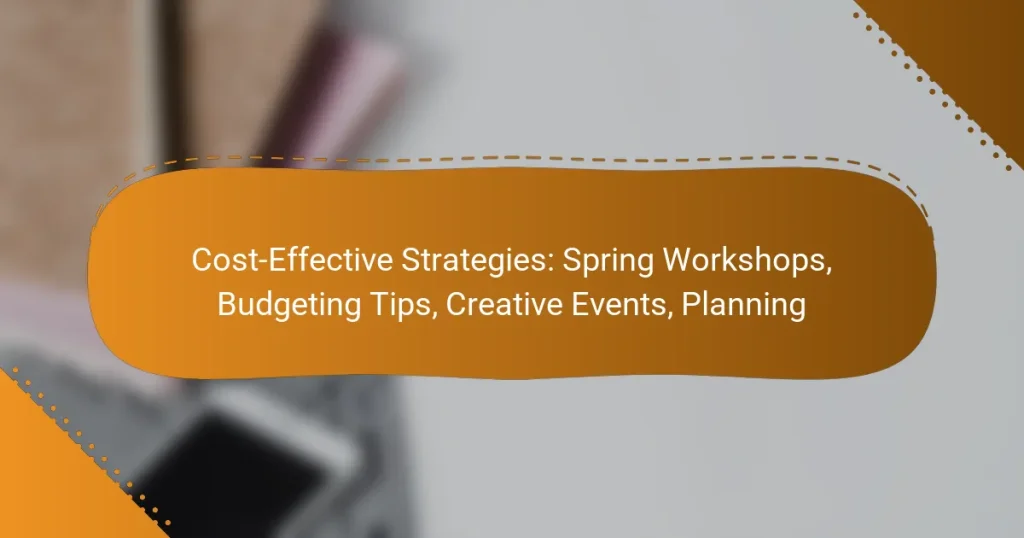Seasonal creative workshops offer an excellent opportunity to engage participants in fun and imaginative activities without breaking the bank. By focusing on budget-friendly ideas, these workshops can cater to diverse interests and skill levels, ensuring accessibility for everyone. Proper budgeting and effective marketing strategies are essential to maximize participation and create a successful experience for all involved.
Cost-Cutting Strategies: Winter Holiday Workshops, Budgeting, Planning
Financial Planning Tips: Fall Workshops, Limited Resources, Budgeting
Financial Tools: Tracking Workshop Expenses, Budgeting, Planning
Budget-Friendly Pricing Models: Seasonal Workshops, Cost Management, Pricing Strategies
Cost-Effective Strategies: Spring Workshops, Budgeting Tips, Creative Events, Planning
Budgeting Tips: Summer Events, Creative Workshops, Under $500
What are budget-friendly seasonal workshop ideas?
Budget-friendly seasonal workshop ideas focus on creative activities that require minimal financial investment while maximizing engagement and enjoyment. These workshops can be tailored to various interests and skill levels, making them accessible to a wide audience.
DIY Holiday Craft Workshops
DIY holiday craft workshops allow participants to create handmade decorations or gifts using inexpensive materials. Common projects include making ornaments, wreaths, or holiday cards, which can often be completed with supplies sourced from local craft stores or even recycled items.
To keep costs low, consider hosting these workshops in community centers or homes, where participants can share tools and materials. Providing a list of required supplies beforehand can also help attendees prepare and budget accordingly.
Seasonal Cooking Classes
Seasonal cooking classes focus on using fresh, local ingredients to prepare dishes that reflect the time of year. These classes can be offered at community kitchens or even outdoors, depending on the season, and often emphasize simple recipes that are easy to replicate at home.
To manage expenses, encourage participants to bring their own ingredients or collaborate on a potluck-style approach. This not only reduces costs but also fosters a sense of community among attendees.
Outdoor Nature Photography Sessions
Outdoor nature photography sessions provide a platform for individuals to explore local parks or natural settings while learning photography skills. These workshops can be conducted at little to no cost, especially if participants use their own cameras or smartphones.
Consider offering tips on composition and lighting, and encourage participants to share their photos in a group setting afterward. This can enhance the experience and build camaraderie among budding photographers.
Community Gardening Events
Community gardening events bring people together to cultivate plants, flowers, or vegetables in shared spaces. These workshops can be organized in local parks or vacant lots, promoting environmental awareness while providing fresh produce.
To keep costs down, participants can contribute seeds or plants from their own gardens. Additionally, collaborating with local gardening clubs or nonprofits can provide resources and expertise without significant financial investment.
Seasonal Art Exhibitions
Seasonal art exhibitions showcase local artists’ work, often centered around a specific theme related to the season. These events can be hosted in community centers or galleries, allowing artists to display their creations at minimal cost.
Encourage artists to contribute pieces that reflect seasonal changes, and consider organizing a small entry fee or donation to cover venue costs. This not only supports local talent but also engages the community in appreciating art.
How to budget for seasonal workshops?
Budgeting for seasonal workshops involves assessing all potential costs and setting a financial framework that ensures profitability. Key areas to focus on include material costs, venue expenses, marketing, and participant fees.
Estimate Material Costs
Estimating material costs is essential for accurate budgeting. Consider all supplies needed for the workshop, such as tools, equipment, and consumables. Depending on the workshop type, material costs can range from a few dollars to several hundred.
To keep expenses manageable, look for bulk purchasing options or local suppliers that offer discounts. Always account for a small buffer in your budget to cover unexpected costs.
Consider Venue Expenses
Venue expenses can significantly impact your overall budget. Costs may include rental fees, utilities, and any necessary permits. Depending on the location and size, venue costs can vary widely, from affordable community centers to higher-end event spaces.
When selecting a venue, consider its accessibility and amenities, as these can affect participant turnout. Always compare multiple options to find the best balance between cost and suitability.
Factor in Marketing Budget
A well-planned marketing budget is crucial for attracting participants. This budget should cover online advertising, promotional materials, and any partnerships with local businesses. Depending on your target audience, marketing costs can range from minimal social media ads to larger campaigns.
Utilize free or low-cost marketing channels, such as social media and community boards, to maximize reach without overspending. Track your marketing effectiveness to adjust strategies as needed.
Set Participant Fees
Setting participant fees is a critical step in ensuring your workshop’s financial viability. Fees should cover all costs while remaining competitive and attractive to potential attendees. Research similar workshops to determine a reasonable price range.
Consider offering early bird discounts or group rates to encourage sign-ups. Be transparent about what the fees include, such as materials and refreshments, to enhance perceived value.
What are effective marketing strategies for workshops?
Effective marketing strategies for workshops focus on reaching the right audience and creating compelling offers. Utilizing various channels and incentives can significantly increase attendance and engagement.
Utilize Social Media Platforms
Social media platforms are essential for promoting workshops, as they allow for targeted outreach to specific demographics. Create engaging content that highlights the workshop’s benefits, such as videos, testimonials, and behind-the-scenes glimpses.
Consider using platforms like Facebook, Instagram, and LinkedIn to reach different audiences. For instance, Facebook events can help you manage RSVPs, while Instagram stories can showcase real-time updates and engagement.
Collaborate with Local Influencers
Partnering with local influencers can amplify your workshop’s visibility and credibility. Influencers often have established trust with their followers, making their endorsements valuable for attracting attendees.
Identify influencers who align with your workshop’s theme and audience. Offer them free tickets or exclusive access in exchange for promotion on their channels. This strategy can lead to increased reach and a more engaged audience.
Offer Early Bird Discounts
Early bird discounts encourage attendees to register ahead of time, helping you gauge interest and secure funding for your workshop. Offering a discount of 10-20% for early sign-ups can create a sense of urgency and boost initial registrations.
Clearly communicate the deadline for these discounts in your marketing materials. This tactic not only incentivizes quick decisions but also helps with budgeting and planning for the event.
What tools can help with workshop planning?
Effective workshop planning requires the right tools to streamline processes and enhance organization. Utilizing platforms for ticketing, promotional materials, and project management can significantly improve efficiency and reduce stress.
Eventbrite for Ticketing
Eventbrite is a widely used platform for managing event ticketing. It allows you to create event pages, sell tickets online, and track registrations easily. Consider using it to set up different ticket tiers, such as early bird or group discounts, to attract a wider audience.
When using Eventbrite, be mindful of their fees, which typically range from 2% to 5% per ticket sold, depending on your pricing structure. It’s essential to factor these costs into your overall budget to ensure profitability.
Canva for Promotional Materials
Canva is an intuitive design tool perfect for creating promotional materials like flyers, social media posts, and banners. With a variety of templates available, you can quickly produce professional-looking graphics without needing extensive design skills.
Utilize Canva’s collaborative features to involve team members in the design process. This can enhance creativity and ensure that all promotional materials align with your workshop’s branding. Remember to check the licensing for images and elements used in your designs to avoid copyright issues.
Trello for Project Management
Trello is an effective project management tool that helps you organize tasks visually using boards, lists, and cards. This can be particularly useful for tracking progress on various aspects of your workshop, from logistics to marketing efforts.
To maximize Trello’s potential, create separate boards for different teams or phases of the workshop. Set deadlines and assign tasks to team members to maintain accountability. Regularly review and update the boards to keep everyone aligned and on schedule.
What are the prerequisites for hosting a workshop?
Hosting a workshop requires careful planning and preparation to ensure its success. Key prerequisites include identifying your target audience and securing any necessary permits or approvals.
Define Target Audience
Understanding your target audience is crucial for tailoring the workshop content and format. Consider demographics such as age, interests, and skill levels to create a relevant experience.
Engage with potential participants through surveys or social media to gather insights on their preferences. This feedback can guide your topic selection and marketing strategies, ensuring higher attendance and satisfaction.
Secure Necessary Permits
Before hosting a workshop, check local regulations to determine if permits are required. This may vary based on the venue, type of activity, and expected attendance.
Common permits include those for public gatherings, food service, or use of specific facilities. Contact local authorities or consult a legal expert to ensure compliance and avoid potential fines.





